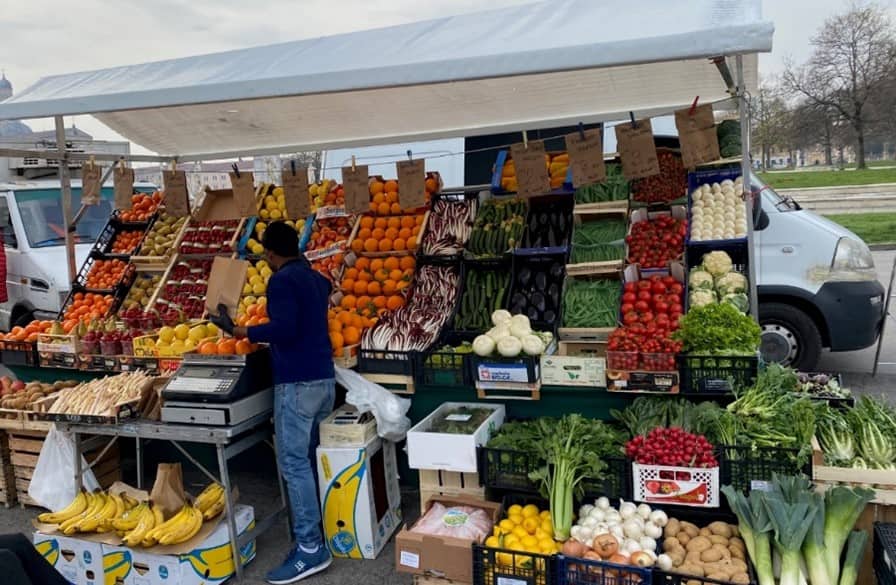NEWS
Stay updated on the latest developments in plant science policy and EPSO activities!
The 28th Europe-wide seminar of the series supported by the European Plant Science Organisation (EPSO) and aimed at the Plant Science community and its stakeholders.
TTT: The seminar will be held online each third Thursday of the month at three (CET).
On 14th December 2023 at 15:00 (CET) we will present three talks exploring “The Cutting Edge of Cell Imaging in Plants”

Prof. Ralf Jungmann, The Max Planck Institute of Biochemstry, Munich, Germany: “Ångström-resolution fluorescence microscopy”

Manuel Neumann, Institute for Biology, Humboldt-University Berlin, Germany: “A 3D gene expression atlas of the floral meristem based on spatial reconstruction of single nucleus RNA sequencing data”

Assoc. Prof. Notburga Gierlinger, BOKU, Institute of Biophysics, Vienna, Austria: “Raman Imaging of Plant Tissues: microchemistry in context with anatomical structure”
The seminars will be hosted on Zoom and last approximately 1.5 hours. Numbers will be limited to 300 attendees and therefore please register early if you would like to join. There will be ample opportunities to ask questions and join the debate. So please join us to support this new and exciting initiative for European Plant Science by following this link just prior to the start of the seminar.
EPSO members register in advance for this meeting: registration link
After registering, you will receive a confirmation email containing information about joining the meeting.
In the coming months we will be on the lookout for talented plant scientists among the EPSO membership to present their findings and perspectives to the EPSO seminar series. If we approach you to talk, we hope you will be happy to support the initiative. This is a fantastic opportunity for both eminent world leaders and talented up-and-coming early career researchers to present their research to an international audience and to network with potential collaborators. If you wish to suggest a theme for one of the autumn seminars and / or nominate yourself or one of your colleagues to give a seminar, we most welcome your suggestions. Please contact Tim George ([email protected]) to provide your name and potential talk title.
We look forward to seeing you all for the 28th EPSO seminar on the 14th December 2023.
Tim George, Alan Schulman and Marie-Theres Hauser
EPSO Plant Science Seminar Series Organising Committee
Click here to read: Full EPSO news item
Contacts:
Tim George, Hutton / UK & EPSO Board
Alan Schulman, LUKE / FI & Adviser to the EPSO Board
Marie-Theres Hauser BOKU / AT & EPSO Board
The EPSO Working Group on Nutritional Security finalised its programme for its fourth workshop taking place online on the 4th December 2023.
The food nutritional security goal foresees to ensure sufficient, safe, highly nutritious food, sustain local communities and foster correct lifestyles and healthy ageing for all. The current climate change and other stress factors, such as world population growth, wars and local conflicts, new emerging zoonotic diseases, are impacting on our dietary choices.
To reach the nutritional security goal, there is a need to redesign our food systems towards more sustainable, resilient ones which can be capable of providing enough food with a high nutritional quality for everyone.
In this context, the EPSO ‘Nutritional Security’ Working Group aims to discuss and contribute to defining new paths and solutions for innovative solutions in the food and nutrition area:
- Genetic improvement of major and minor crops
- Novel technologies for crop biofortification
- Minor crops and novel foods for more sustainable productions and nutritious diets
- Assessing the nutritional value of high nutritious food
- Discussion towards the next consensus document
Registration and talk title submissions should be made by email to Katia Petroni [email protected] and Angelo Santino [email protected] until 1st December 2023.
The workshop will start at 13:45 and end at 17:15.
We look forward to meeting you on the 4th December!
Katia, Angelo, Monica, Chiara, Marina, Theresa and Karin
Katia Petroni, Angelo Santino, Monica Schreiner, Chiara Tonelli, Marina Korn, Theresa Fitzpatrick (Organising Committee) and Karin Metzlaff (EPSO Executive Director).
Click here to read: The Programme of the 4th workshop on Nutritional Security at 27.11.2023
Contacts:
Katia Petroni, University of Milan, IT & EPSO NS WG
Angelo Santino, CNR, IT & EPSO NS WG chair
EPSO is pleased to announce the publication of its 58th newsletter. The shorter public version of the Newsletter is available here. EPSO members can log in and read the full version available in the Members’ Only section. The next edition of the EPSO newsletter will be published in spring 2024. Please send us your articles by mid April. Happy reading!
Content of the full version
Editorial
- SLU’s Jens Sundström, as co-chair of EPSO’s Agricultural Technologies Working Group, sets out EPSO’s response to the EC’s legal proposal on NGTs
EPSO activities
- EPSO’s Executive Director Dr Karin Metzlaff reports back on the EPSO General Meeting held at HHU in Düsseldorf last June
- The Initiative for Science in Europe makes its recommendations on Horizon Europe & FP10
- Call launched for the EPSO Young Plant Scientist 2024 – deadline 31 January
- Read about EPSO’s involvement in the EC’s Expert group on Forest & Forestry Stakeholder Platform, Green Era Hub, & Crop XR Stakeholder Board
- The successful monthly EPSO Plant Science Seminar series continues attracting healthy audiences into its third year & provides a platform for experienced and talented young plant scientists to showcase their research
- Prepare your interactive event for the seventh edition of the globally successful Fascination of Plants Day taking place around 18 May 2024
- ERA-Net SusCrop publishes its White Paper on future research needs in sustainable agriculture & the winners of the video contest on ‘What does sustainable development mean to you?’ are announced!
- EPSO’s Working Groups report back on their activities over the past six months and what is in the pipeline for the coming months.
Members’ news
- the InnCoCells project reports on its progress at the half-way stage
- KU Leuven Plant Institute joins EPSO as a new member
- Hutton’s Root2Res project addresses root traits for breeders & geneticists
- CRAG’s project on bioluminescent bacteria and algae for illuminating cities
- Happy 80th IPK Gatersleben!
- ****SAVE THE DATE**** 18th symposium on insect-plant relationships, Bielefeld DE
- TSL researchers report on Investing in Wheat Pathogens’ Surveillance: Wheat DEWAS
- PlantLink Day 2023 highlighted sustainable solutions for resilient agrifood systems
- Read CNR’s article on getting a little help from the baker’s yeast
- Jülich’s AgroServ project will launch further transnational access calls in 2024
- PSC anniversary symposium, 8th December: highlighting the impact of plant sciences on our lives
- In Utrecht, the Crop XR initiative is about making crops more resilient, sustainable & climate adaptive
- SLU report on NordPlant & UPSCALE’s advice to the Nordic Council of Ministers
National, European and global funding
- National Research Funding Opportunities in France & UK
- Updates on the Horizon Europe work programme 2024 & Life programme, WEAVE webinar
- Bayer Foundation’s Science Fellowship Programme
Career opportunities and upcoming events
- find the latest career opportunities & events in plant science
About EPSO
Contacts:
Karin Metzlaff, EPSO
John Fitzgibbon, EPSO
EPSO welcomes the move towards a more proportionate regulatory environment for NGT crops. EPSO acknowledges that the proposal is a balanced compromise and supports most of its content, especially the quasi-equivalence of NGT1 plants with conventionally bred ones and the omission of additional labelling requirements beyond the seed labelling.
EPSO has identified a few elements in the legal proposal that should be addressed:
1-Criteria for determining the status of NGT1 plants:
EPSO suggests that the maximum number of targeted genetic changes allowed in NGT1 plants (20) should be counted per basic set of chromosomes to compensate for differences in genome size and complexity between different plant species.
2-Field trials:
EPSO believes that the legislation should enable a simplified approval system for field trials for scientific purposes.
3-Not exclude NGT1 plants from organic farming practices:
For the benefit of organic farming, EPSO strongly recommends that excluding NGT1 category plants should not be part of this legislation.
EPSO looks forward to engaging as a major stakeholder with Member States, the European Parliament and the European Commission to achieve a well-balanced regulation. EPSO will continue providing scientific input in the course of the discussions with policy makers and other stakeholders.
Read the full EPSO statement to the EC’s legal proposal for a Regulation of the European Parliament and of the Council on plants obtained by certain NGTs and their food and feed”, 5.11.2023.
Read the summary that was submitted to the EC consultation on 5.11.2023 [Feedback reference F3442539].
- EC legal proposal for a Regulation of the European Parliament and of the Council on plants obtained by certain new genomic techniques and their food and feed, 5.7.2023
Contacts:
Jens Sundström, SLU Uppsala, EPSO Chair WG Agricultural Technologies
Alan Schulman, LUKE / FI, EPSO Chair WG Agricultural Technologies
Odd Arne Rognli, NMBU / NO, EPSO President
Karin Metzlaff, EPSO Executive Director
European Learned Societies and Research Organisations collaborate supporting all fields of science and at a European level collaborate in the Initiative for Science in Europe (ISE) to engage in European science strategies and policies. They published on 26.10.2023 their main recommendations on Horizon Europe and towards FP10:
- Shield Marie Skłodowska-Curie Actions and the European Research Council
- Boost collaborative basic research to complete the Research & Innovation Cycle in Pillar 2
- The Widening Challenge – facilitate access to the three Pillars in HE
- Without Researchers no Research
- Why consulting European academic associations can help policy makers.
EPSO is a founding member of ISE and Karin Metzlaff chairs the ISE Working Group on Horizon Europe and towards FP10.
Click here to read: the ‘ISE main recommendations on Horizon Europe and towards FP10’, 26.10.2023.
Related ISE links:
ISE position Horizon Europe consultation & Press Release 20.2.&3.3.2023; updated October 2023.
ISE position on Horizon Europe, 12.7.2021
Contacts:
Karin Metzlaff – Chair ISE Working Group Horizon Europe & EPSO Executive Director
Enrique Sanchez – Vice-Chair ISE Working Group Horizon Europe & EPS
Monica Dietl – Executive Coordinator ISE
The 27th Europe-wide seminar of the series supported by the European Plant Science Organisation (EPSO) and aimed at the Plant Science community and its stakeholders.
TTT: The seminar will be held online each third Thursday of the month at three (CET).
On 16th November 2023 at 15:00 (CET) we will present three talks exploring “The potential of gene editing”.

Mariette Andersson, The Swedish University of Agricultural Sciences (SLU), Stockholm, Sweden: “The Swedish CRISPR-potato – a sustainability challenge solved with a few cuts in the genome”

Frank Hartung, EPSO Agricultural Technologies Working Group: “European regulation of GM plants: The new proposal and some implications”

Gwendolyn Kirchner, The James Hutton Institute, Dundee, UK: “ENHANCED GRAVITROPISM2 controls root angle in barley and wheat”
The seminars will be hosted on Zoom and last approximately 1.5 hours. Numbers will be limited to 300 attendees and therefore please register early if you would like to join. There will be ample opportunities to ask questions and join the debate. So please join us to support this new and exciting initiative for European Plant Science by following this link just prior to the start of the seminar.
EPSO members register in advance for this meeting: registration link
After registering, you will receive a confirmation email containing information about joining the meeting.
In the coming months we will be on the lookout for talented plant scientists among the EPSO membership to present their findings and perspectives to the EPSO seminar series. If we approach you to talk, we hope you will be happy to support the initiative. This is a fantastic opportunity for both eminent world leaders and talented up-and-coming early career researchers to present their research to an international audience and to network with potential collaborators. If you wish to suggest a theme for one of the autumn seminars and / or nominate yourself or one of your colleagues to give a seminar, we most welcome your suggestions. Please contact Tim George ([email protected]) to provide your name and potential talk title.
We look forward to seeing you all for the 27th EPSO seminar on the 16th November 2023.
Tim George, Alan Schulman and Marie-Theres Hauser
EPSO Plant Science Seminar Series Organising Committee
Click here to read: Full EPSO news item
Contacts:
Tim George, Hutton / UK & EPSO Board
Alan Schulman, LUKE / FI & Adviser to the EPSO Board
Marie-Theres Hauser BOKU / AT & EPSO Board

